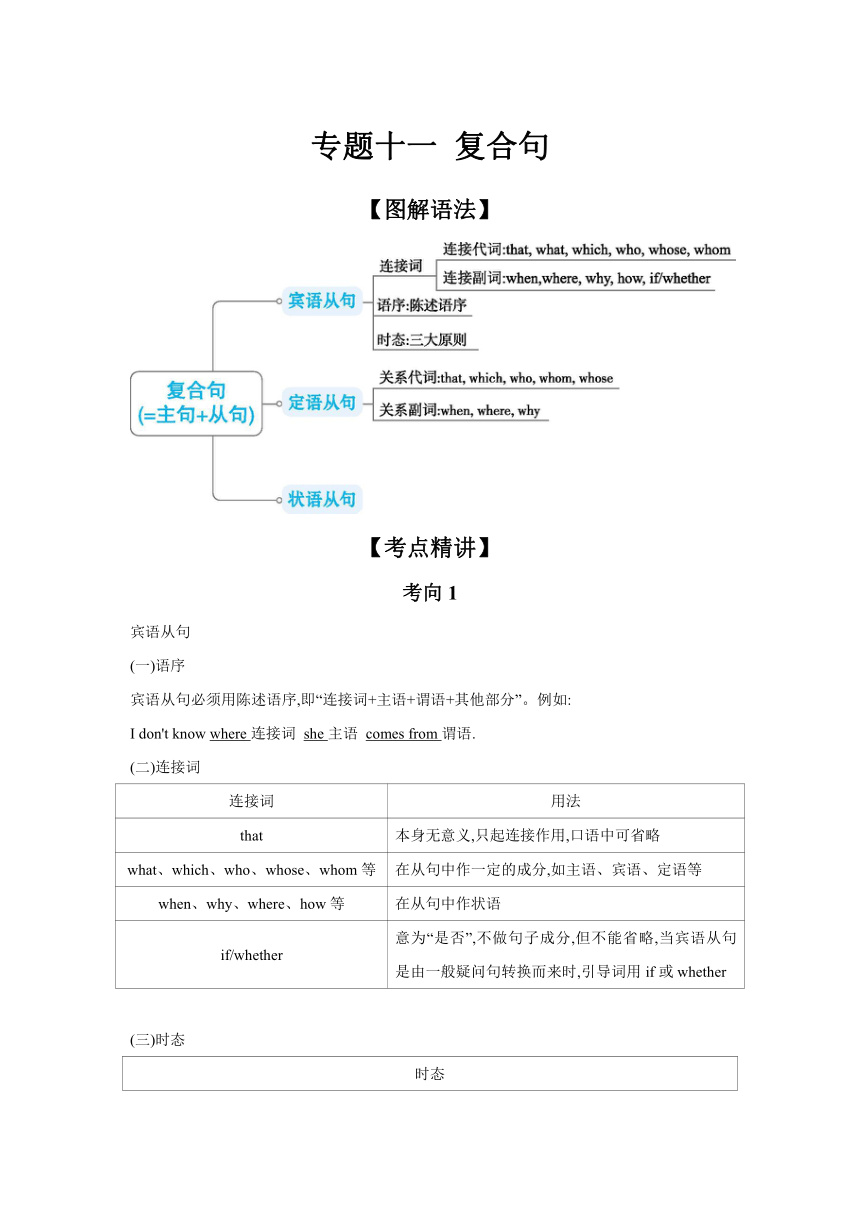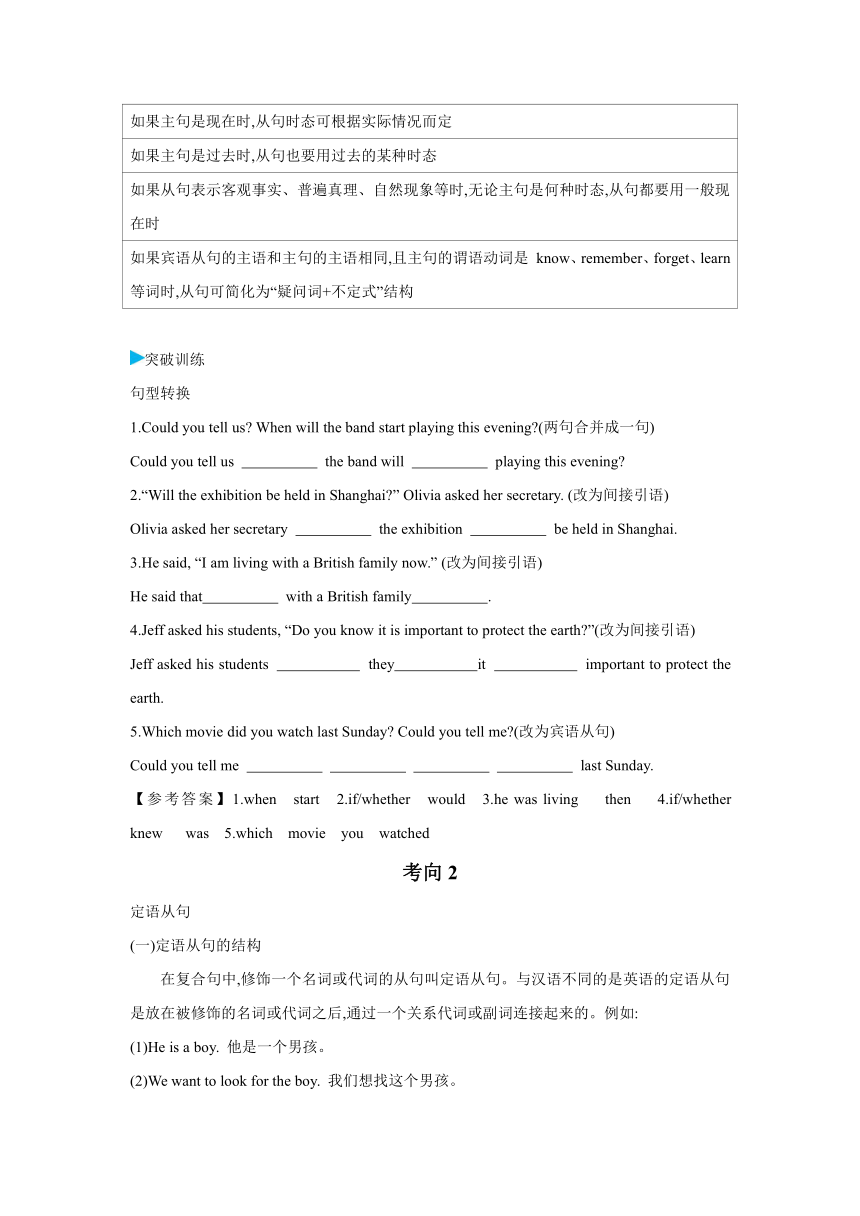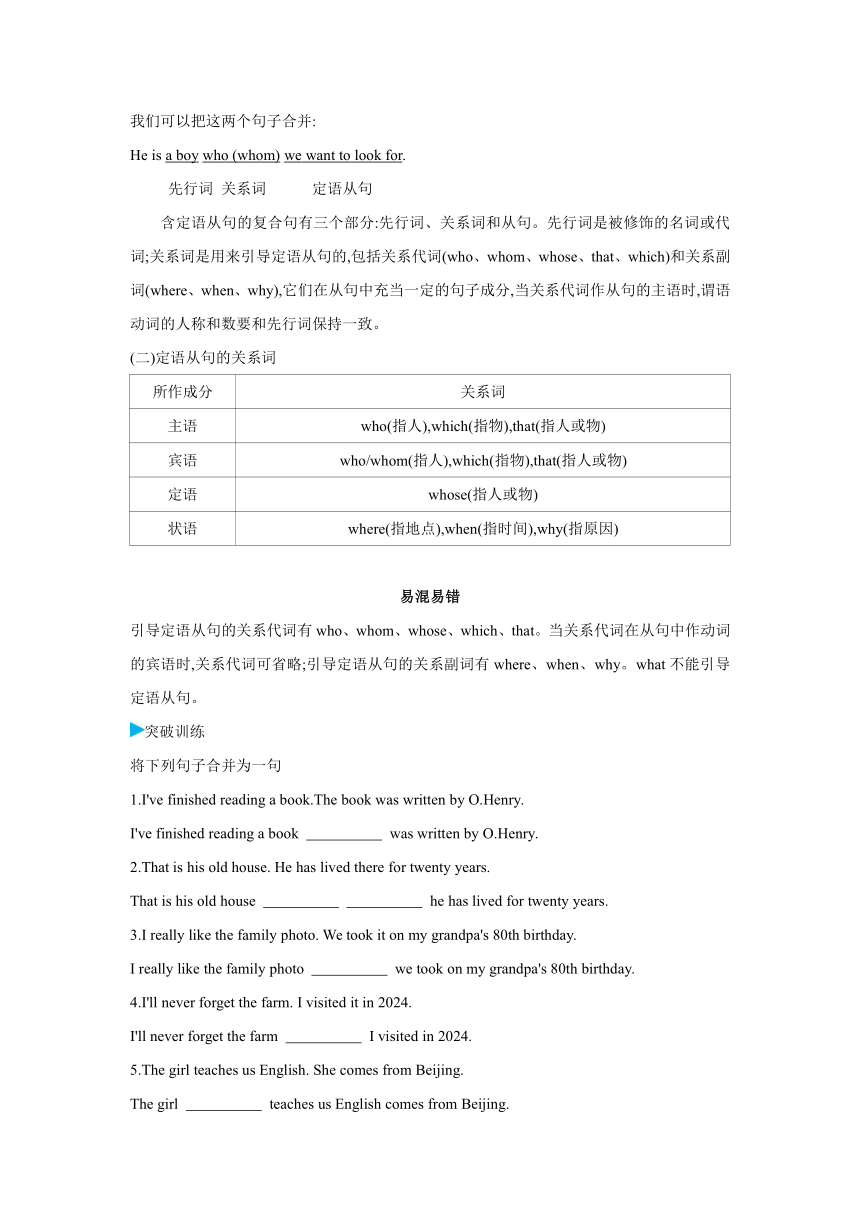【特色专题专训】专题十一 复合句 2025年中考人教版英语总复习 (广东专版)(含解析)
文档属性
| 名称 | 【特色专题专训】专题十一 复合句 2025年中考人教版英语总复习 (广东专版)(含解析) |  | |
| 格式 | docx | ||
| 文件大小 | 156.3KB | ||
| 资源类型 | 教案 | ||
| 版本资源 | 人教新目标(Go for it)版 | ||
| 科目 | 英语 | ||
| 更新时间 | 2024-11-14 10:57:46 | ||
图片预览



文档简介
专题十一 复合句
【图解语法】
【考点精讲】
考向1
宾语从句
(一)语序
宾语从句必须用陈述语序,即“连接词+主语+谓语+其他部分”。例如:
I don't know where连接词 she主语 comes from谓语.
(二)连接词
连接词 用法
that 本身无意义,只起连接作用,口语中可省略
what、which、who、whose、whom等 在从句中作一定的成分,如主语、宾语、定语等
when、why、where、how等 在从句中作状语
if/whether 意为“是否”,不做句子成分,但不能省略,当宾语从句是由一般疑问句转换而来时,引导词用if或whether
(三)时态
时态
如果主句是现在时,从句时态可根据实际情况而定
如果主句是过去时,从句也要用过去的某种时态
如果从句表示客观事实、普遍真理、自然现象等时,无论主句是何种时态,从句都要用一般现在时
如果宾语从句的主语和主句的主语相同,且主句的谓语动词是 know、remember、forget、learn等词时,从句可简化为“疑问词+不定式”结构
突破训练
句型转换
1.Could you tell us When will the band start playing this evening (两句合并成一句)
Could you tell us the band will playing this evening
2.“Will the exhibition be held in Shanghai ” Olivia asked her secretary. (改为间接引语)
Olivia asked her secretary the exhibition be held in Shanghai.
3.He said, “I am living with a British family now.” (改为间接引语)
He said that with a British family .
4.Jeff asked his students, “Do you know it is important to protect the earth ”(改为间接引语)
Jeff asked his students they it important to protect the earth.
5.Which movie did you watch last Sunday Could you tell me (改为宾语从句)
Could you tell me last Sunday.
【参考答案】1.when start 2.if/whether would 3.he was living then 4.if/whether knew was 5.which movie you watched
考向2
定语从句
(一)定语从句的结构
在复合句中,修饰一个名词或代词的从句叫定语从句。与汉语不同的是英语的定语从句是放在被修饰的名词或代词之后,通过一个关系代词或副词连接起来的。例如:
(1)He is a boy. 他是一个男孩。
(2)We want to look for the boy. 我们想找这个男孩。
我们可以把这两个句子合并:
He is a boy who (whom) we want to look for.
先行词 关系词 定语从句
含定语从句的复合句有三个部分:先行词、关系词和从句。先行词是被修饰的名词或代词;关系词是用来引导定语从句的,包括关系代词(who、whom、whose、that、which)和关系副词(where、when、why),它们在从句中充当一定的句子成分,当关系代词作从句的主语时,谓语动词的人称和数要和先行词保持一致。
(二)定语从句的关系词
所作成分 关系词
主语 who(指人),which(指物),that(指人或物)
宾语 who/whom(指人),which(指物),that(指人或物)
定语 whose(指人或物)
状语 where(指地点),when(指时间),why(指原因)
易混易错
引导定语从句的关系代词有who、whom、whose、which、that。当关系代词在从句中作动词的宾语时,关系代词可省略;引导定语从句的关系副词有where、when、why。what不能引导定语从句。
突破训练
将下列句子合并为一句
1.I've finished reading a book.The book was written by O.Henry.
I've finished reading a book was written by O.Henry.
2.That is his old house. He has lived there for twenty years.
That is his old house he has lived for twenty years.
3.I really like the family photo. We took it on my grandpa's 80th birthday.
I really like the family photo we took on my grandpa's 80th birthday.
4.I'll never forget the farm. I visited it in 2024.
I'll never forget the farm I visited in 2024.
5.The girl teaches us English. She comes from Beijing.
The girl teaches us English comes from Beijing.
【参考答案】1.that(which) 2.in which 3.that / which / 不填 4.that / which / 不填 5.that / who
考向3
状语从句
(一)状语从句的连词
(二)状语从句的时态
主将从现 时间状语从句或条件状语从句中,主句用一般将来时,从句要用一般现在时表示一般将来时的意义
过去时态 (1)若主句和从句都是叙述过去的事情,则主句和从句可用一般过去时或过去进行时 (2)since引导的时间状语从句中,从句常用一般过去时,主句常用现在完成时或一般现在时,即“It is/has been+时间段+since+一般过去时”
主现从现 若主句为祈使句或主句中有情态动词,那么从句应用一般现在时表将来
突破训练
用括号中动词的适当形式填空
1.She (cook) when someone knocked at the door.
2.How time flies!It is two months since we (meet) last time.
3.—Mike, let's prepare for our baseball game.
—OK.We'll lose the game unless we (try) our best.
4.If it doesn't rain this weekend,we (have) a picnic in Jinquan Park.
5.I'll call you as soon as I (get) to Beijing.
【参考答案】1.was cooking 2.met 3. try 4.will have 5.get
【随堂练习】
选词填空(可重复使用)
which who whose where what
when how why whether that
1.—I am worried about I can enter a good high school or not.
—Take it easy. Believe in yourself!
2.—I'll never forget the years I lived on the farm with the farmers.
—It must have a great effect on your life.
3.The speech contest, the topic of is “Man and Nature”, will be held in the Room 10 from 2:00 to 5:00 on the afternoon of May 10th.
4.Have you seen the film Titanic, leading actor is world-famous
5.The famous basketball player, tried to make a comeback, attracted a lot of attention.
6.Carol said the work would be done by October, I personally doubt very much.
7.—I don't know I should do during the summer vacation. Do you have any advice
—How about doing some part-time jobs
8.—Could you please tell me you bought the book yesterday
—In the bookshop nearby.
9.—Do you know the students like playing football so much
—Because it is interesting.
10.I am looking for the dictionary you lent to me yesterday.
11.The city I used to live is becoming better and better.
12.It turns out the disease has something to do with wild animals.
13.Our boss tells us no news is good news.
14.Do you know the girl is in red
15.—I want to know you made the delicious food by yourself.
—Last night.
16.Tom doesn't know he and his friends can do to help the little girl.
17.—Could you tell me we can get to the supermarket
—By bus.
18.They wonder robots will make people lose their jobs or not.
19.I'm not sure it will rain tomorrow.
20.I can't decide dress I should buy.
【参考答案】
1.whether 2.when 3.which 4.whose 5.who
6.which 7.what 8.where 9.why 10.which/that 11.where 12.that 13.that 14.who/that 15.when 16.what 17.how 18.whether 19.whether 20.which
【仿真训练】
短文填空
A(改编)
If you live in Shanghai, you might have taken a “lesson” in sorting garbage. The city introduced new garbage-sorting regulations (规章) a few years ago.
Shanghai is a city 1. carries out strict regulations on garbage sorting and recycling. Shanghai requires its residents (居住者) to sort garbage into four categories (种类) namely recyclable, harmful, dry and wet waste. If people fail to sort their garbage properly, they will be fined up to 200 yuan.
Since the regulations took effect, the amount of total daily waste in Shanghai has been reduced. It's said 2. Shanghai is making efforts to develop long-term solutions to garbage management.
However, there have also been some problems. Some people complained 3. it was difficult to deal with wet garbage, as they were asked to remove wet garbage from its bag when dumping (丢弃). According to the sorting rules, the wet garbage must go in the wet waste bin and the bag must go in the dry waste bin.
“This separation is necessary, as it ensures 4. the wet garbage will be decomposed (分解) properly and become useful organic (有机的) waste,” Bureau said.
B
Nowadays, many children are treated as “little emperors” at home. Parents show much love to their children. As a result, when they face problems, they don't know 1. to do. So it's important for children to learn to be independent.
In my opinion, parents should believe their children and never do everything for them. Parents should remember 2. it's necessary to give their children proper advice and more chances to make their own decisions.
As for children, they shouldn't depend on their parents too much. They should learn 3. they should do. It helps develop their independence and teaches them 4. they could look after themselves.
In a word, parents should keep in mind 5. the earlier children learn to be independent, the better they will be in the future.
【参考答案】
A
1.which/that 2.that 3.that 4.that
B
1.what 2.that 3.what 4.how 5.that
【图解语法】
【考点精讲】
考向1
宾语从句
(一)语序
宾语从句必须用陈述语序,即“连接词+主语+谓语+其他部分”。例如:
I don't know where连接词 she主语 comes from谓语.
(二)连接词
连接词 用法
that 本身无意义,只起连接作用,口语中可省略
what、which、who、whose、whom等 在从句中作一定的成分,如主语、宾语、定语等
when、why、where、how等 在从句中作状语
if/whether 意为“是否”,不做句子成分,但不能省略,当宾语从句是由一般疑问句转换而来时,引导词用if或whether
(三)时态
时态
如果主句是现在时,从句时态可根据实际情况而定
如果主句是过去时,从句也要用过去的某种时态
如果从句表示客观事实、普遍真理、自然现象等时,无论主句是何种时态,从句都要用一般现在时
如果宾语从句的主语和主句的主语相同,且主句的谓语动词是 know、remember、forget、learn等词时,从句可简化为“疑问词+不定式”结构
突破训练
句型转换
1.Could you tell us When will the band start playing this evening (两句合并成一句)
Could you tell us the band will playing this evening
2.“Will the exhibition be held in Shanghai ” Olivia asked her secretary. (改为间接引语)
Olivia asked her secretary the exhibition be held in Shanghai.
3.He said, “I am living with a British family now.” (改为间接引语)
He said that with a British family .
4.Jeff asked his students, “Do you know it is important to protect the earth ”(改为间接引语)
Jeff asked his students they it important to protect the earth.
5.Which movie did you watch last Sunday Could you tell me (改为宾语从句)
Could you tell me last Sunday.
【参考答案】1.when start 2.if/whether would 3.he was living then 4.if/whether knew was 5.which movie you watched
考向2
定语从句
(一)定语从句的结构
在复合句中,修饰一个名词或代词的从句叫定语从句。与汉语不同的是英语的定语从句是放在被修饰的名词或代词之后,通过一个关系代词或副词连接起来的。例如:
(1)He is a boy. 他是一个男孩。
(2)We want to look for the boy. 我们想找这个男孩。
我们可以把这两个句子合并:
He is a boy who (whom) we want to look for.
先行词 关系词 定语从句
含定语从句的复合句有三个部分:先行词、关系词和从句。先行词是被修饰的名词或代词;关系词是用来引导定语从句的,包括关系代词(who、whom、whose、that、which)和关系副词(where、when、why),它们在从句中充当一定的句子成分,当关系代词作从句的主语时,谓语动词的人称和数要和先行词保持一致。
(二)定语从句的关系词
所作成分 关系词
主语 who(指人),which(指物),that(指人或物)
宾语 who/whom(指人),which(指物),that(指人或物)
定语 whose(指人或物)
状语 where(指地点),when(指时间),why(指原因)
易混易错
引导定语从句的关系代词有who、whom、whose、which、that。当关系代词在从句中作动词的宾语时,关系代词可省略;引导定语从句的关系副词有where、when、why。what不能引导定语从句。
突破训练
将下列句子合并为一句
1.I've finished reading a book.The book was written by O.Henry.
I've finished reading a book was written by O.Henry.
2.That is his old house. He has lived there for twenty years.
That is his old house he has lived for twenty years.
3.I really like the family photo. We took it on my grandpa's 80th birthday.
I really like the family photo we took on my grandpa's 80th birthday.
4.I'll never forget the farm. I visited it in 2024.
I'll never forget the farm I visited in 2024.
5.The girl teaches us English. She comes from Beijing.
The girl teaches us English comes from Beijing.
【参考答案】1.that(which) 2.in which 3.that / which / 不填 4.that / which / 不填 5.that / who
考向3
状语从句
(一)状语从句的连词
(二)状语从句的时态
主将从现 时间状语从句或条件状语从句中,主句用一般将来时,从句要用一般现在时表示一般将来时的意义
过去时态 (1)若主句和从句都是叙述过去的事情,则主句和从句可用一般过去时或过去进行时 (2)since引导的时间状语从句中,从句常用一般过去时,主句常用现在完成时或一般现在时,即“It is/has been+时间段+since+一般过去时”
主现从现 若主句为祈使句或主句中有情态动词,那么从句应用一般现在时表将来
突破训练
用括号中动词的适当形式填空
1.She (cook) when someone knocked at the door.
2.How time flies!It is two months since we (meet) last time.
3.—Mike, let's prepare for our baseball game.
—OK.We'll lose the game unless we (try) our best.
4.If it doesn't rain this weekend,we (have) a picnic in Jinquan Park.
5.I'll call you as soon as I (get) to Beijing.
【参考答案】1.was cooking 2.met 3. try 4.will have 5.get
【随堂练习】
选词填空(可重复使用)
which who whose where what
when how why whether that
1.—I am worried about I can enter a good high school or not.
—Take it easy. Believe in yourself!
2.—I'll never forget the years I lived on the farm with the farmers.
—It must have a great effect on your life.
3.The speech contest, the topic of is “Man and Nature”, will be held in the Room 10 from 2:00 to 5:00 on the afternoon of May 10th.
4.Have you seen the film Titanic, leading actor is world-famous
5.The famous basketball player, tried to make a comeback, attracted a lot of attention.
6.Carol said the work would be done by October, I personally doubt very much.
7.—I don't know I should do during the summer vacation. Do you have any advice
—How about doing some part-time jobs
8.—Could you please tell me you bought the book yesterday
—In the bookshop nearby.
9.—Do you know the students like playing football so much
—Because it is interesting.
10.I am looking for the dictionary you lent to me yesterday.
11.The city I used to live is becoming better and better.
12.It turns out the disease has something to do with wild animals.
13.Our boss tells us no news is good news.
14.Do you know the girl is in red
15.—I want to know you made the delicious food by yourself.
—Last night.
16.Tom doesn't know he and his friends can do to help the little girl.
17.—Could you tell me we can get to the supermarket
—By bus.
18.They wonder robots will make people lose their jobs or not.
19.I'm not sure it will rain tomorrow.
20.I can't decide dress I should buy.
【参考答案】
1.whether 2.when 3.which 4.whose 5.who
6.which 7.what 8.where 9.why 10.which/that 11.where 12.that 13.that 14.who/that 15.when 16.what 17.how 18.whether 19.whether 20.which
【仿真训练】
短文填空
A(改编)
If you live in Shanghai, you might have taken a “lesson” in sorting garbage. The city introduced new garbage-sorting regulations (规章) a few years ago.
Shanghai is a city 1. carries out strict regulations on garbage sorting and recycling. Shanghai requires its residents (居住者) to sort garbage into four categories (种类) namely recyclable, harmful, dry and wet waste. If people fail to sort their garbage properly, they will be fined up to 200 yuan.
Since the regulations took effect, the amount of total daily waste in Shanghai has been reduced. It's said 2. Shanghai is making efforts to develop long-term solutions to garbage management.
However, there have also been some problems. Some people complained 3. it was difficult to deal with wet garbage, as they were asked to remove wet garbage from its bag when dumping (丢弃). According to the sorting rules, the wet garbage must go in the wet waste bin and the bag must go in the dry waste bin.
“This separation is necessary, as it ensures 4. the wet garbage will be decomposed (分解) properly and become useful organic (有机的) waste,” Bureau said.
B
Nowadays, many children are treated as “little emperors” at home. Parents show much love to their children. As a result, when they face problems, they don't know 1. to do. So it's important for children to learn to be independent.
In my opinion, parents should believe their children and never do everything for them. Parents should remember 2. it's necessary to give their children proper advice and more chances to make their own decisions.
As for children, they shouldn't depend on their parents too much. They should learn 3. they should do. It helps develop their independence and teaches them 4. they could look after themselves.
In a word, parents should keep in mind 5. the earlier children learn to be independent, the better they will be in the future.
【参考答案】
A
1.which/that 2.that 3.that 4.that
B
1.what 2.that 3.what 4.how 5.that
同课章节目录
- 词法
- 名词
- 动词和动词短语
- 动词语态
- 动词时态
- 助动词和情态动词
- 非谓语动词
- 冠词
- 代词
- 数词和量词
- 形容词副词及其比较等级
- 介词和介词短语
- 连词和感叹词
- 构词法
- 相似、相近词比较
- 句法
- 陈述句
- 一般疑问句和否定疑问句
- 特殊疑问句及选择疑问句
- 反意疑问句
- 存在句(There be句型)
- 宾语从句
- 定语从句
- 状语从句
- 主谓一致问题
- 简单句
- 并列句
- 复合句
- 主谓一致
- 主、表语从句
- 名词性从句
- 直接引语和间接引语
- 虚拟语气
- 感叹句
- 强调句
- 倒装句
- 祈使句
- 句子的成分
- 句子的分类
- 题型专区
- 单项选择部分
- 易错题
- 完形填空
- 阅读理解
- 词汇练习
- 听说训练
- 句型转换
- 补全对话
- 短文改错
- 翻译
- 书面表达
- 任务型阅读
- 语法填空
- 其他资料
